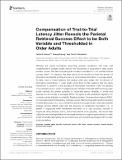Compensation of trial-to-trial latency jitter reveals the parietal retrieval success effect to be both variable and thresholded in older adults
Abstract
Although the neural mechanism supporting episodic recollection has been well characterized in younger adults, exactly how recollection is supported in older adults remains unclear. The electrophysiological correlate of recollection-the parietal retrieval success effect-for example, has been shown to be sensitive to both the amount of information recollected and the accuracy of remembered information in younger adults. To date, there is mixed evidence that parietal effect also scales with the amount of information remembered in older adults whilst there is little evidence that the same mechanism is sensitive to the accuracy of recollected information. Here, we address one potential concern when investigating Event Related Potentials (ERPs) among older adults-namely, the greater potential for single-trial latency variability to smear and reduces the amplitudes of averaged ERPs. We apply a well-established algorithm for correcting single-trial latency variability, Residual Iteration Decomposition Analysis (RIDE), to investigate whether the parietal retrieval success effect among older adults is sensitive to retrieval accuracy. Our results reveal that similar to younger adults, older adult parietal retrieval success effects scale with the accuracy of recollected information-i.e., is greater in magnitude when recollected information is of high accuracy, reduced in magnitude when accuracy is low, and entirely absent when guessing. The results help clarify the functional significance of the neural mechanism supporting recollection in older adults whilst also highlighting the potential issues with interpreting average ERPs in older adult populations.
Citation
Murray , J G , Ouyang , G & Donaldson , D I 2019 , ' Compensation of trial-to-trial latency jitter reveals the parietal retrieval success effect to be both variable and thresholded in older adults ' , Frontiers in Aging Neuroscience , vol. 10 , 179 . https://doi.org/10.3389/fnagi.2019.00179
Publication
Frontiers in Aging Neuroscience
Status
Peer reviewed
ISSN
1663-4365Type
Journal article
Description
JM was supported by the SINAPSE Postdoctoral and Early Career Researcher Exchange (PECRE) grant: SFC project code H11004. GO is partly supported by Seed Fund for Basic Research from The University of Hong Kong (201804159003). DD is a member of the SINAPSE collaboration (www.sinapse.ac.uk), a pooling initiative funded by the Scottish Funding Council and the Chief Scientific Office of the Scottish Executive.Collections
Items in the St Andrews Research Repository are protected by copyright, with all rights reserved, unless otherwise indicated.

